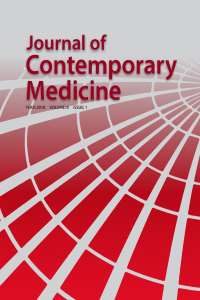Fiberoptik Bronkoskopi Eşliğinde Perkütan Trakeostomi Tecrübelerimiz
Trakeostomi, Fiberoptik Bronkoskop, Yoğun Bakım
OUR EXPERIENCES DEAL WITH PERCUTANEOUS TRACHEOSTOMY GUIDED WITH FIBER OPTIC BRONCOSCOPY
Tracheostomy; Fiberoptic; Critical Care,
___
- Kolleff MH. Tracheostomy for respiratory failure: we need more answers. Chest. 2004;125:7-9
- Borman J, Davidson JT. A history of tracheostomy: Si spiritim ducit vivit. Br J Anaesth 1963;35:388-90.
- Shelden CH, Pudenz RH, Tichy FY. Percutaneous tracheotomy. JAMA 1957; 165: 2068-70
- Ciaglia P, Firsching R, Syniec C. Elective percutaneous dilatational tracheostomy. A simple bedside procedure. Preliminary report. Chest 1985;87:715-29.
- Griggs WM, Worley LIG, Gilligan JE, Thomas PD, Myburg JA. A simple percutaneous tracheostomy technique. Surg Gynecol Obstet 1990;170:543-55.
- Kost KM. Percutaneous tracheostomy: comparison of Ciaglia and Griggs techniques Crit Care 2000, 4:143-46
- Demirel İ; Griggs Yöntemi İle Açılan 52 0lguda Perkütan TS Sonuçlarımız; Fırat Tıp Dergisi 2010;15: 140-42
- Bishop G, Hillman K, Bristow P: Tracheostomy. In: Vincent JL, ed. Yearbook of intensive care and emergency medicine. Berlin, Heidelberg: SpringerVerlag; 1997; 457-69.
- Heffner JE. The role of tracheostomy in weaning. Chest 2001;120:477-81.
- Hinerman R, Alvarez F, Keller CA. Outcome of bedside percutaneous tracheostomy with bronchoscopic guidance. Intensive Care Med 2000;26:1850-56.
- Reilly PM, Sing RF, Giberson FA. Hypercarbia during tracheostomy: A comparison of ercutaneous, endoscopic, percutaneous Doppler, and standart surgical tracheostomy. Intensive Care Med 1997;23: 859-64.
- Delaney A, Bagshaw SM, Nalos M. Percutaneous dilatational tracheostomy versus surgical tracheostomy in critically ill patients: a systematic review and metaanalysis. Crit Care. 2006;10:1-13.
- Eló G, Pénzes I. Role of percutaneous tracheostomy in intensive care: a review. Orv Hetil. 2002;28:875-79.
- Ravat F, Pommier C, Dorne R. Percutaneous tracheostomy. Ann Fr Anesth Reanim. 2001;20:260-81.
- Walz MK, Peitgen K, Thürauf N, Trost HA, Wolfhard U, Sander A, Ahmadi C, Eigler FW. Percutaneous dilatational tracheostomy early results and long-termoutcome of 326 critically ill patients. Intensive Care Med. 1998;24:685-90.
- Iwanaka T, Arkovitz MS, Arya G, et al. Evaluation of operative stress and peritoneal macrophage function in minimally invasive operations. J Am Coll Surg. 1997;184:357-63.
- Kaplan A, Yaşar MA, Özer AB. Griggs, PerkuTwist ve Ciaglia Perkütan Trakeotomi Yöntemlerinin Karşılaştırılması. Fırat Tıp Dergisi 2010;15: 173-17
- Escarment J, Suppini A, Sallaberry M, Kaiser E, Cantais E, Palmier B and J, Quinot F. Percutaneous tracheostomy by forceps dilation: report of 162 cases. Anaesthesia, 2000; 55: 125-30.
- Sağıroğlu AE, Ağkoç E, Doğan Y, Gömlekçioğlu V, Orhon Z, Yavaş C, Çağlar Ş, Çelik M. Yoğun bakım ünitesinde perkütan ve cerrahi trakeostominin karşılaştırılması. Göztepe Tıp Dergisi 2010;25:67-70, Polderman KH, Spijkstra JJ, de Bree R, et al. Percutaneous dilatational tracheostomy in the ICU: optimal organization, low complication, rates, and description of a new complication. Chest 2003;123:1595-02.
- Paran H, Butnaru G, Hass I, Afanayv A, Gutman M. Evaluation of a modified percutaneous tracheostomy technique without bronchoscopic guidance. Chest 2004;126:868-71.
- Romero CM, Cornejo RA, Ruiz MH, Gálvez LR, Llanos OP, Tobar EA, Larrondo JF, Castro JS. Fiberoptic bronchoscopy-assisted percutaneous tracheostomy is safe in obese critically ill patients: a prospective and comparative study. J Crit Care. 2009;24:494-05.
- Döşemeci L, Yılmaz M, Hadimioğlu N, ve ark. Perkütan Dilatasyonel Trakeostominin Bronkoskopi Eşliğinde Yapılması Pnömotoraks Riskini Azaltabilir. Türk Anest Rean Cem Mecmuası 2001;29:220-25
- Erden V, Hamzaoğlu NŞ, Başaranoğlu G, ve ark. Percu Twist” Yöntemi ile Perkütan Trakeostomi. Yoğun Bakım Dergisi 2004;4:57-60.
- Boonsarngsuk V, Kiatboonsri S, Choothakan S. Percutaneous dilatational tracheostomy with bronchoscopic guidance: Ramathibodi experience. J Med Assoc Thai. 2007;90:1512-17.
- Yayın Aralığı: Yılda 6 Sayı
- Başlangıç: 2011
- Yayıncı: Rabia YILMAZ
Üretral Yabancı Cisim: Bir Olgu
Ozgur ENGİNYURT, Erdal OZER, Bilge PARLAKOGLU, Ali AYYİLDİZ
ACİL SERVİSE BAŞVURAN ZEHİRLENME OLGULARININ GERİYE DÖNÜK İNCELEMESİ
Onur DAL, Hasan KAVAK, Serhat AKAY, E. Erol ÜNLÜER, Ersin AKSAY
Türkiyede obezite, ferritin ve inflamasyon arasındaki ilişkinin varlığı
Hasta Bakımı İçin Simülasyon ve Öğrenme: Akut Alkol Yoksunluğu
Etilenglikol (Antifiriz) entoksikasyonuna bağlı metabolik ensefalopati: Bir olgu sunumu
Retinal Okluziv Vasküler Bozukluklar ve Romatoid Artrit.
Hüseyin ORTAK, Ahmet İNANIR, Selim DEMİR
KARIN AĞRISI İLE SEYREDEN SOL AKCİĞER ALT LOB KİST HİDATİĞİ
PENİSİN MONDOR HASTALIĞI: VAKA SUNUMU
Kemal ENER, Emrah OKULU, Mustafa ALDEMİR, Fatih AKDEMİR, Murat KESKE, Muhammed Fuat ÖZCAN
